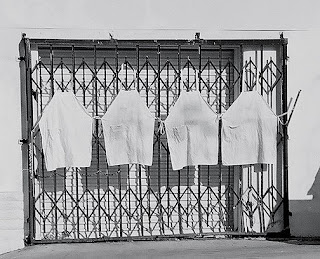By Vichara

We all have the answers. Let that sink in for a while. Say it to yourself again. We all have the answers. There is the factual and those answers are easily obtainable these days by many means, books, video, teachers, Internet, etc. Then there is the esoteric and the answers to those humanistic, emotional questions that to most seem remote and unobtainable. All of the keys that will open the doors of understanding are in everyone’s pocket. Our reluctance to getting the “answers” is not based in ignorance but in reluctance of being patient enough to locate the key to each question that resides in al of us. Sometimes it may take some time to get the answer but with patience you will get there.
garrulous • \GAIR-uh-lus\ • adjective
1 : pointlessly or annoyingly talkative
*2 : wordy
Example Sentence:
With a few judicious revisions, a good editor can often transform garrulous writing into elegant prose.
Did you know?
English has many adjectives that share the meaning "given to talk" or "talking." "Talkative" may imply a readiness to talk or a disposition to enjoy conversation, while "loquacious" suggests the power of expressing oneself articulately, fluently, or glibly. "Voluble" suggests a free, easy, and unending talkativeness, and "garrulous" implies talkativeness that is dull, rambling, or tedious. "Garrulous," by the way, derives from the Latin verb "garrire," which means (no surprise here) "to chatter" or "to babble."

By Vichara

Like most of you I am trying to figure all of “this” out as well. These moments I sit and try to bring in the reins of my emotions and thoughts until there is a quiet moment is a challenge, as it is for all of us. But as I read recently, “whatever can run, can also stand still”. We are all capable of taking hold of life’s remote control and hit pause…just for a moment. Who knows in that moment you might see someone else in that moment and through the acknowledgement recognize like all of us we are just trying to figure “this” out.
durable • \DUR-uh-bul\ • adjective
: able to exist for a long time without significant deterioration; also : designed to be durable
Example Sentence:
The couch is covered in a pretty yet durable fabric, and I hope it will last for years.
Did you know?
Something "durable" lasts a long time, so it's no surprise that the word comes to us, via Anglo-French, from the Latin verb "durare," meaning "to last." Other descendants of "durare" in English include "during," "endure," and "durance" (which now mostly turns up in the phrase "in durance vile," a fancy way of saying "in prison"). "Durable" even has a near synonym in the much rarer "perdurable," which combines "durare" with the prefix "per-" (meaning "throughout") to create a word that can mean "lasting a very long time or indefinitely" or "eternal."

By Vichara

These days there is a great deal of emphasis in the recognizing of our “carbon footprint” in the world and try to reduce it. I think the same kind of principals can be applied to increase our “Compassion Footprint” in the world. As we do little things to lesson the carbon footprint (i.e. using re-usable water bottles, fluorescent light bulbs, etc). Likewise we can do little things to increase our “Compassion Footprint”…be more forgiving of yourself and others, telling someone you love and care for them for no apparent reason, help someone that looks lost and discover the answer together, hold the door for just one more person, make a phone call to someone just to tell them how much they mean to you…you get the picture. Reduce carbon, increase compassion.
heliolatry • \hee-lee-AH-luh-tree\ • noun
: sun worship
Example Sentence:
The Egyptians, who personified the sun as the god Ra, were one of numerous ancient cultures that practiced heliolatry.
Did you know?
The first half of "heliolatry" derives from "hēlios," the Greek word for "sun." In Greek mythology, Hēlios was the god of the sun, imagined as "driving" the sun as a chariot across the sky. From "hēlios" we also get the word "helium," referring to the very light gas that is found in balloons and airships, and "heliocentric," meaning "having or relating to the sun as center," as in "a heliocentric orbit." The suffix "-latry," meaning "worship," derives via Late Latin and French from the Greek "latreia," and can be found in such words as "bardolatry" ("worship of Shakespeare") and "zoolatry" ("animal worship"). A person who worships the sun is called a heliolater.

By Vichara

Between us exists a thread that connects everyone. On a macro level it may not appear that big but on a micro level it is hunormous (I know a made up word for bloody big!). Within these very strong fibrous strands that connects us all is all of the hopes, dreams, pain, inspirations, anxiety, the collective range of the human that has been shared and will continue to be shared. For those that become cognizant of these fibers will recognize when one of the foundation strands of love and compassion is weak in a fellow being and will help pull it taught for them and in turn they to you.
etiolate • \EE-tee-uh-layt\ • verb
*1 : to bleach and alter the natural development of (a green plant) by excluding sunlight
2 a : to make pale b : to deprive of natural vigor : make feeble
Example Sentence:
The bean plants that Grace grew for her lab project became weak and etiolated when they were kept in a dark closet for a week.
Did you know?
When we first started using "etiolate" in the late 1700s (borrowed from the French verb "étioler"), it was in reference to purposely depriving growing celery of light. The word traces back to an Old French word for "straw" and is related to the Latin word for "straw" or "stalk," which is "stipula." Nowadays the term for growing veggies as pale as straw is now more likely to be "blanch," which can mean "to bleach (the leaves or stalks of plants) by earthing, boarding, or wrapping," among other things. "Etiolate" is more apt to refer to depriving plants in general of light; when "etiolated," they are sickly, pale, and spindly. The figurative sense of "etiolate" ("to make pallid or feeble") first appeared in the 1800s as a natural outgrowth of the original sense

By Vichara
 Guru Craig's Thought Of The Day...
Guru Craig's Thought Of The Day...
We are all full of so many insecurities and to compensate we sometimes overcompensate. The person driving that very loud motorcycle or car because they were ignored when they were young. The person compelled to dress in a manner that is so outrageous because they want to be noticed and feel special. Most of these insecurities are fed by the dictatorship of the industries that have understood the frailties of these souls and feed upon them like some crazed hungry soul. It is hard and sometimes impossible for those captured and manipulated by these companies to break free from their perceived dependence. Only when we can manage, little by little, bit by bit, to help each other learn through love, patience and compassion, that we will learn that there are things more important then what they force us to like.
Word Of The Day...
jingoism • \JING-goh-is-uhm\ • noun
extreme chauvinism or nationalism marked especially by a belligerent foreign policy
Example Sentence:
Albert Einstein was a pacifist who found German jingoism, with its ultra-nationalistic ideology and militaristic policy, so objectionable that he left his homeland in 1933, never to return.
Did you know?
"Jingoism" originated during the Russo-Turkish War of 1877-1878, when many British citizens were hostile toward Russia and felt Britain should intervene in the conflict. Supporters of the cause expressed their sentiments in a music-hall ditty with this refrain:
"We don't want to fight, yet by jingo if we do,
We've got the ships, we've got the men,
We've got the money, too!"
Someone holding the attitude implied in the song became known as a "jingo" or "jingoist," and the attitude itself was dubbed "jingoism." The "jingo" in the tune is probably a euphemism for "Jesus."

By Vichara
 We are all full of so many insecurities and to compensate we sometimes overcompensate. The person driving that very loud motorcycle or car because they were ignored when they were young. The person compelled to dress in a manner that is so outrageous because they want to be noticed and feel special. Most of these insecurities are fed by the dictatorship of the industries that have understood the frailties of these souls and feed upon them like some crazed hungry soul. It is hard and sometimes impossible for those captured and manipulated by these companies to break free from their perceived dependence. Only when we can manage, little by little, bit by bit, to help each other learn through love, patience and compassion, that we will learn that there are things more important then what they force us to like.
We are all full of so many insecurities and to compensate we sometimes overcompensate. The person driving that very loud motorcycle or car because they were ignored when they were young. The person compelled to dress in a manner that is so outrageous because they want to be noticed and feel special. Most of these insecurities are fed by the dictatorship of the industries that have understood the frailties of these souls and feed upon them like some crazed hungry soul. It is hard and sometimes impossible for those captured and manipulated by these companies to break free from their perceived dependence. Only when we can manage, little by little, bit by bit, to help each other learn through love, patience and compassion, that we will learn that there are things more important then what they force us to like.

By Vichara
 Guru Craig's Thought Of The Day...
Guru Craig's Thought Of The Day...
Awakening to a new day is like walking on to a construction site on the first day. All of the materials to build the foundation is there waiting in various locations in front of you. You need to walk forward and pick up each brick with confidence and determination and believe today's edifice will be stronger than yesterdays by using tools of love and compassion. And when this day is built you get another chance tomorrow to build once again with the wisdom of today.
Word Of The Day...
titivate • \TIH-tuh-vayt\ • verb to make or become smart or spruce Example Sentence: "Work could undoubtedly be done on the show to titivate it for Broadway -- but the score will remain a problem, if not a liability." (Clive Barnes, The New York Post, August 13, 2000)
Did you know?
"Titivate," "spruce," "smarten," and "spiff" all mean "to make a person or thing neater or more attractive." "Titivate" often refers to making small additions or alterations in attire ("titivate the costume with sequins and other accessories") and can also be used figuratively, as in our example sentence. "Spruce up" is sometimes used for cosmetic changes or renovations that give the appearance of newness ("spruce up the house with new shutters and fresh paint before trying to sell it"). "Smarten up" and "spiff up" both mean to improve in appearance often by making more neat or stylish ("the tailor smartened up the suit with minor alterations"; "he needed some time to spiff himself up for the party"). The origins of "titivate" are uncertain, but it may have been formed from the English words "tidy" and "renovate."

By Vichara

Guru Craig's Thought Of The Day...
If there were ways to reassure ourselves that things on a daily basis would be ok, most of us would seize the opportunity. However the undercurrent impermanence of everything has domain over every aspect of every moment of every day and creates challenges for those of us who do do not like things challenging. We can choose an erratic existence and be troubled by every thing or we can be strong like water and flow along and embrace and learn from change. Meld as change happens.
Word Of The Day...
subreption • \sub-REP-shun\ • noun
a deliberate misrepresentation; also : an inference drawn from it
Example Sentence:
Shareholders have filed a class action lawsuit against the company for its subreption of earnings and losses.
Did you know?
In canon law and Scots law, subreption is the obtainment of a dispensation or gift by concealment of the truth, whereas obreption is the obtainment of a dispensation or gift by fraud. Both terms are from Latin nouns: respectively, "subreptio," meaning "the act of stealing," and "obreptio," meaning "the act of stealing upon." The derivation of "subreption" also traces to the Latin verb "surripere," meaning "to take away secretly," which is the base of the Anglicized term "surreptitious," a synonym of "stealthy." "Obreption" shares an ancestor with the word "reptile": Latin "repere," meaning "to creep."







 We are all full of so many insecurities and to compensate we sometimes overcompensate. The person driving that very loud motorcycle or car because they were ignored when they were young. The person compelled to dress in a manner that is so outrageous because they want to be noticed and feel special. Most of these insecurities are fed by the dictatorship of the industries that have understood the frailties of these souls and feed upon them like some crazed hungry soul. It is hard and sometimes impossible for those captured and manipulated by these companies to break free from their perceived dependence. Only when we can manage, little by little, bit by bit, to help each other learn through love, patience and compassion, that we will learn that there are things more important then what they force us to like.
We are all full of so many insecurities and to compensate we sometimes overcompensate. The person driving that very loud motorcycle or car because they were ignored when they were young. The person compelled to dress in a manner that is so outrageous because they want to be noticed and feel special. Most of these insecurities are fed by the dictatorship of the industries that have understood the frailties of these souls and feed upon them like some crazed hungry soul. It is hard and sometimes impossible for those captured and manipulated by these companies to break free from their perceived dependence. Only when we can manage, little by little, bit by bit, to help each other learn through love, patience and compassion, that we will learn that there are things more important then what they force us to like.

